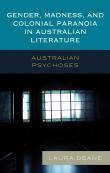 6256047748388895265.jpg
6256047748388895265.jpg
 Gender, Madness, and Colonial Paranoia in Australian Literature : Australian Psychoses
single work
Gender, Madness, and Colonial Paranoia in Australian Literature : Australian Psychoses
single work
 6256047748388895265.jpg
6256047748388895265.jpg
 Gender, Madness, and Colonial Paranoia in Australian Literature : Australian Psychoses
single work
Gender, Madness, and Colonial Paranoia in Australian Literature : Australian Psychoses
single work
'This book offers an original and compelling analysis of women’s madness, gender and the Australian family. Taking up Anne McClintock’s call for critical works that psychoanalyze colonialism, this radical re-assessment of novels by Christina Stead and Kate Grenville provides a sustained account of women’s madness and masculine colonial psychosis from a feminist postcolonial perspective. This book rethinks women’s madness in the context of Australian colonialism. Taking novels of madness by Christina Stead and Kate Grenville as its point of critical departure, it applies a post-Reconciliation lens to the study of Australia’s gender and racial codes, to place Australian sexism and misogyny in their proper colonial context. Employing madness as a frame to rethink postcolonial theorizing in Australia, Gender, Madness, and Colonial Paranoia in Australian Literature psychoanalyses colonialism to argue that Australia suffers from a cultural pathology based in the strategic forgetting of colonial violence. This pathology takes the form of colonial paranoia about ‘race’ and gender, producing distorted gender codes and ways of being Australian. This book maps the contours of Australian colonial paranoia, weaving feminist literary theory, psychoanalysis and postcolonial theory with poststructuralist approaches to reassess the traditional canon of critical madness scholarship, and the place of women’s writing within it. This provocative work marks a radical departure from much recent feminist, cultural, and postcolonial criticism, and will be essential reading for students of Australian literature, cultural studies and gender studies wanting a new insight into how the Australian psyche is shaped by settler colonialism.' (Publication Summary)
'Gender and madness appear in the question that opens this book: ‘What is a madwoman?’ (ix). The answer is provided through the lens of feminist literary theory, psychoanalysis and postcolonial theory; Laura Deane is a lecturer at Flinders University with expertise in literary theory and world literature. As the title of the book also indicates, ‘Australian literature’ is the prime focus of her enquiry, with ‘colonial paranoia’ playing an important part in the analysis.' (Introduction)
'Gender and madness appear in the question that opens this book: ‘What is a madwoman?’ (ix). The answer is provided through the lens of feminist literary theory, psychoanalysis and postcolonial theory; Laura Deane is a lecturer at Flinders University with expertise in literary theory and world literature. As the title of the book also indicates, ‘Australian literature’ is the prime focus of her enquiry, with ‘colonial paranoia’ playing an important part in the analysis.' (Introduction)